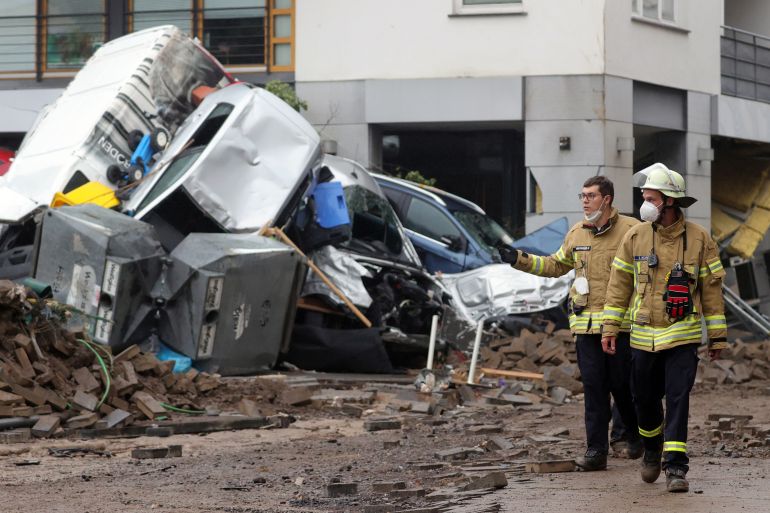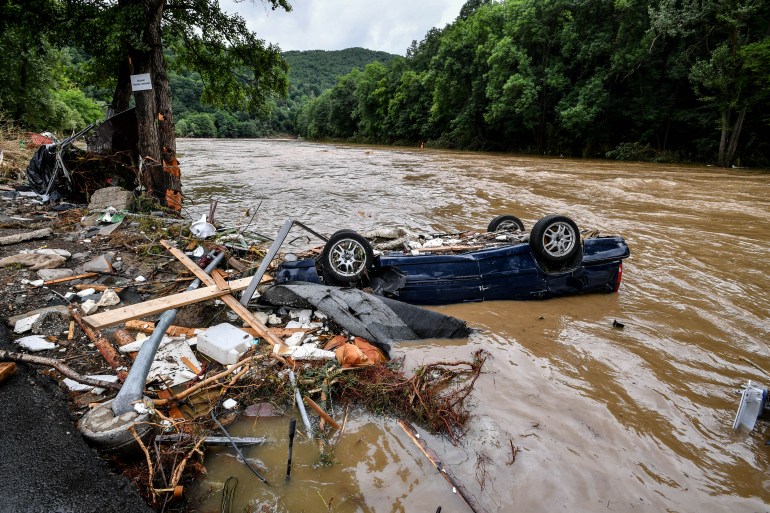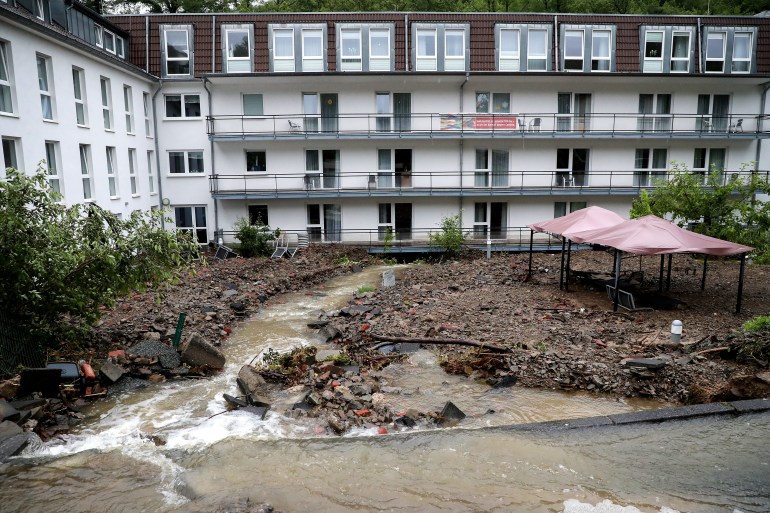Germany, Belgium floods: Toll exceeds 100, with hundreds missing
Dozens of people remain missing as severe floods sweep through western Germany and other parts of Europe.

The death toll from devastating floods across parts of western Germany has risen to 93, according to local authorities, pushing the total toll of flooding in Western Europe past 100, as the search continued for hundreds of people still unaccounted for.
Authorities in the German state of Rhineland-Palatinate said scores of people had died there, including at least nine residents of an assisted living facility for people with disabilities.
Keep reading
list of 4 itemsAt least 50 killed in heavy rains, floods in Afghanistan’s Ghor province
Rainfall set to help crews battling wildfire near Canada’s Fort McMurray
Canada wildfires spur evacuation orders, warnings: What you need to know
In neighbouring North Rhine-Westphalia state officials put the death toll at dozens, and warned that the figure could rise further. About 1,300 people were still reported missing, though authorities said efforts to contact them could be hampered by disrupted roads and phone connections.
In a provisional tally, the Belgian death toll has risen to 12, with 5 people still missing, local authorities and media report early on Friday.
German Chancellor Angela Merkel, on a visit to Washington, DC, voiced her shock at the scope of the flooding, saying “I grieve for those who have lost their lives in this disaster”. She said the number of dead was likely to rise further. “We still don’t know the number. But it will be many.”
Speaking at the White House, Merkel said the day was “characterised by fear, by despair, by suffering, and hundreds of thousands of people all of a sudden were faced with catastrophe”.
“My heart goes out to all of those who in this catastrophe lost their loved ones, or who are still worrying about the fate of people still missing,” she said.
Among the worst-hit German villages was Schuld, where several homes collapsed and dozens of people remained unaccounted for.
Rescue operations were hampered by blocked roads and phone and internet outages across the Eifel, a volcanic region of rolling hills and small valleys. Some villages were reduced to rubble as old brick and timber houses couldn’t withstand the sudden rush of water, often carrying trees and other debris as it gushed through narrow streets.
Karl-Heinz Grimm, who had come to help his parents in Schuld, said he had never seen the small Ahr River surge in such a deadly torrent.
“This night, it was like madness,” he said.
Dozens of people had to be rescued from the roofs of their homes with inflatable boats and helicopters. Hundreds of soldiers were deployed to assist in the rescue efforts.
“There are people dead, there are people missing, there are many who are still in danger,” the governor of Rhineland-Palatinate state, Malu Dreyer, told the regional parliament. “We have never seen such a disaster. It’s really devastating.”

In Belgium, the Vesdre River spilt over its banks and sent water churning through the streets of Pepinster, near Liege, where a rescue operation by firefighters went wrong when a small boat capsized and three elderly people disappeared.
“Unfortunately, they were quickly engulfed,” said Mayor Philippe Godin. “I fear they are dead.”
In Verviers, the prosecutor’s office said several bodies had been found but could not confirm local media reports that four people were killed there.
Major highways were inundated in southern and eastern parts of the country, and the railway said all trains were halted.
In Liege, a city of 200,000, the Meuse River overflowed its banks on Thursday and the mayor asked people living nearby to move to higher ground.
EU Commission President Ursula von der Leyen pledged to help, tweeting: “My thoughts are with the families of the victims of the devastating floods in Belgium, Germany, Luxembourg and the Netherlands and those who have lost their homes.”

The full extent of the damage was still unclear, with many villages cut off by floods and landslides that made roads impassable. Videos on social media showed cars floating down streets and houses partially collapsed. Many of the dead were only discovered after floodwaters receded.
Authorities in the Rhine-Sieg county south of Cologne ordered the evacuation of several villages below the Steinbach reservoir amid fears a dam could break.
Laschet, a conservative who is running to succeed Merkel as chancellor in this fall’s election, said the unusually heavy storms and an earlier heatwave could be linked to climate change. Political opponents have criticised Laschet, the son of a miner, for supporting the region’s coal industry and hampering the expansion of wind power during his tenure.

In the Netherlands, King Willem-Alexander and Queen Maxima visited the hard-hit Dutch town of Valkenburg on Thursday evening to support residents and emergency services. Flooding turned the main street into a torrent of brown water, inundating homes and businesses.
The Dutch government sent about 70 troops to the southern province of Limburg late Wednesday to help with evacuations and filling sandbags.
Thousands of people in neighbourhoods of the city of Maastricht and other villages along the Maas River were ordered to evacuate amid threats of flooding, and centres were set up to house them. The Maas is the Dutch name for the Meuse River.
